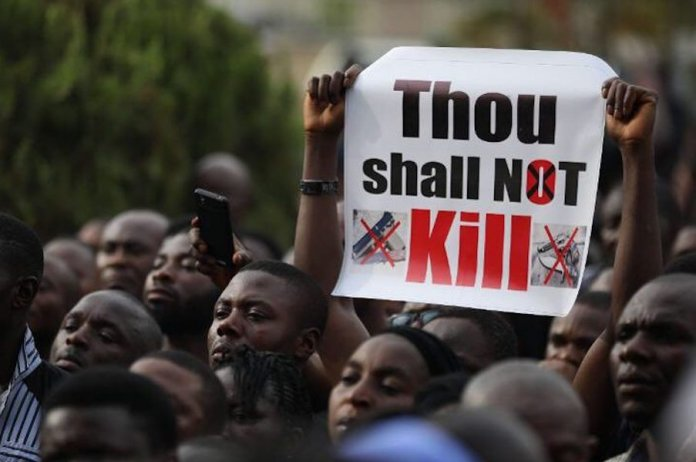- Invites protesting British legislators to Nigeria
- Says plans to convoke religious dialogue underway
The Presidency yesterday rejected a report by some British Parliamentarians alleging genocide against Christians in Nigeria.
In the report released this week, the United Kingdom’s All-Party Parliamentary Group on International Religious Freedom or Belief, (APPG) said Christians were being targeted in Nigeria because of their faith and that genocide was looming.
But the Presidency denied the claim, saying both President Muhammadu Buhari and Vice President Yemi Osinbajo, who are Muslim and Christian respectively, are committed to addressing issues fueling religious crises in the country.
APPG, a group of over 100 British parliamentarians from different political parties, and from both the House of Lords and the House of Commons, had in the 56-page report on Tuesday, alleged that given the way Christians were being killed in Nigeria, without any known political will by the government to stop such killings, “genocide is looming in Nigeria.”
The group, which said it exists to promote Article 18 of the Universal Declaration of Human Rights, said it was shocking that Nigeria, a Commonwealth country, could be ranked 12th on Open Doors World Watch List 2020.
According to the group, it was disturbing that Nigeria ranked among “extreme” countries where there is religious intolerance, and where Christians face the greatest level of persecution in the world.
Such countries and their ranks, as highlighted by the group, are: Syria (11th); Nigeria (12th); Saudi Arabia (13th); Iraq (15th); Egypt (16th) and Sri Lanka (30th). It said: “Nigeria is currently just one rank below ‘extreme.”
But in a statement yesterday, Presidential spokesman, Garba Shehu, said Boko Haram insurgents target Christians because they know it drives religious tensions in the country.
Shehu said the Buhari administration was committed to addressing these challenges and had already begun taking measures.
Shehu said: “The President and government of Nigeria wish to thank members of the United Kingdom All-Party Parliamentary Group on International Religious Freedom or Belief for their report, launched a few days ago.
“Although it is difficult reading, the statement also acknowledges the importance of accurate, unbiased, depoliticised and truthful information when it comes to understanding the realities and addressing the challenges for those of faith in Nigeria.
“In this regard, when uncritical attention is afforded to critics with dubious intentions, it only becomes harder for both the government and people of Nigeria to engage in constructive dialogue to resolve our differences, and uphold what is enshrined in our constitution and laws: that everyone has the right to freedom of thought, conscience and religion.
“In concert with our American and British allies, Nigeria’s military have pushed back the terrorists and largely reduced their capacity over the last five years compared to the previous decade.
“Boko Haram terrorists have targeted Christians and Churches specifically because they know it drives forward religious and land tensions already existent in the country. Similarly, they attack mosques and Muslims in order to issue the threat: radicalise or become targets yourselves.”
He said while the government was increasing efforts “to fully defeat and finally finish Boko Haram”, it has not stopped seeking to negotiate for those held captive by the insurgents.
According to him, under the leadership of Vice-President Yemi Osinbajo, there are efforts to unite the country through dialogue as regards religious differences.
“The president and government have and will at all times work with those – both within and outside Nigeria – with a concern for the rights to freedom of thought, conscience and religion,” he said.
“In this regard, we look forward to welcoming members of the All-Party Parliamentary Group to our country to see for themselves the work that is going on to promote these fundamental rights of our citizens.”
Shehu stated that the federal government “is committed to promoting unity among adherents of different religions.”
He disclosed that plans were underway by President Muhammadu Buhari and Vice-President Yemi Osinbajo to convoke a religious dialogue aimed at addressing prevalent tension in the country.
The presidential spokesman then proceeded to unveil initiatives conceived to achieve peace and promote unity among Muslims and Christians.
He said: “In the months and years ahead, our President who is Muslim and our Vice President who is an evangelical Christian pastor are irrevocably committed to addressing these multiple and long-term challenges for today’s and future generations. These include:
“Continuing and increasing Nigeria’s efforts, alongside our allies, to fully defeat and finally finish Boko Haram, in order to bring security to the north of the country.
“Continuing to seek, negotiate for, and secure the return of all those held hostage and in captivity by the terrorists, regardless of the religious faith or belief.
“Uniting our nation through dialogue organised around respect for difference in religion. Such a programme is already underway under the leadership of the Vice President, Pastor Yemi Osinbajo.”
“Addressing, through joint federal and state governments’ programmes, access to arable farmland, with land mandated both for farmers and herders. The federal government will issue detailed measures regarding this plan and its rollout in the coming weeks
“Countering fake news, particularly on social and digital media, by working with the non-partisan stakeholder community, the National Broadcasting Commission and social media platforms themselves, to address the proliferation of false and inflammatory commentary.”
The statement added that both the president and the federal government would, at all times, work with individuals within and outside Nigeria who are concerned about citizens’ rights to freedom of thought, conscience and religion.
Source: THISDAY












